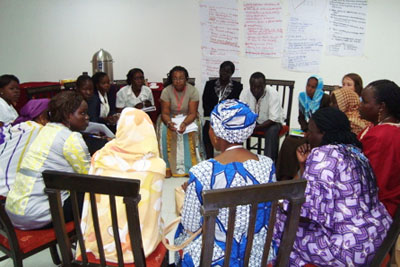
With the triumphant success of the South Sudan referendum, the transitioning state is looking ahead toward consultations regarding the new constitution and government. Although this transitional phase poses major challenges, it also holds an unparalleled window of opportunity for marginalized groups to push for inclusive rights and representation—especially women.
Overall the largest gains for women in Africa have been in states experiencing post-conflict transition, particularly because it allows for a complete restructuring of the government and constitution. Leading up to July’s official secession date, many women in South Sudan have recognized this opportunity to mobilize and are leading the way in the push toward gender inclusion and female rights in the new state.
Grassroots organizations such as My Sister’s Keeper and South Sudan Women’s Empowerment Network are facilitating this wave of empowerment through a network of advocacy among women in Sudan and the diaspora. The organizations focus on empowering women through education, training, support, and collaboration, to achieve gender inclusivity at all levels of society. Currently they are advocating for women’s rights and gender sensitivities to be included in the new constitution, and for women to hold more positions, as well as more prominent roles, within the government and its working groups.
“There are some major things that need to be addressed in the new constitution,” said Sarah Cleto Rial, program director of My Sister’s Keeper who is a southern Sudan native, and recipient of the 2010 Eleanor Roosevelt Human Rights Award. "If women are not present, these issues will not be addressed.” She emphasized the importance for women in South Sudan to become active participants in the consultation process and the dire need to bring gender sensitive issues to the negotiating table.
Through initiatives such as Pathways to Peace, led by My Sister’s Keeper, “Women [in Sudan] are becoming more aware of their power to create change through collaboration with other women,” Rial said. They are beginning to ask questions that focus more on the inclusion of women in the peacebuilding processes and post-referendum arrangements, such as: What are the roles of women? How can women participate in the post-referendum process? How can women be represented in their communities?
International tools such as Convention on the Elimination of All Forms of Discrimination Against Women can serve as potential leverage for local women during this period of transition. Security Council Resolution 1325 is currently pending translation into five Sudanese languages—Bari, Dinka, Juba Arabic, Nuer, and Shiluk—and will provide further support for women to press for gender inclusion and representation in the new government and constitution.
Even if gender equity and female rights are written into the new South Sudan constitution, customary law will remain a difficult obstacle to overcome, Rial pointed out. A report by the United Nations Population Fund last month highlighted that women in South Sudan still lack rights in regard to sexual violations and reproductive rights, divorce, and child custody. The report estimated that "over 90 percent of day-to-day criminal and civil cases are executed under customary law, which is largely not only inconsistent with international human rights laws, but also favour men.” Therefore by including women in the consultation process as well as in South Sudan’s permanent government structure, these challenges of customary law could be addressed.
Rial emphasized that now is the time for women in Sudan to raise their voices. In order for the Government of South Sudan to hold comprehensive, inclusive consultations that would be inclusive of all citizens, Rial suggested that the country’s leaders should reach out and encourage women to become a part of the consultative process. “It is not going to be easy,” she heeded. “But it is needed for stability in the country.”
Looking ahead, Rial and other Sudanese women Enough spoke to recognize that some gender inclusive reforms may be slow in coming. It is important, however, to recognize the significance of this current transition period as a unique opportunity for the development of women’s rights. “Maybe I will not live that long to see the changes,” Rial said. “But there is hope now for women in South Sudan.”
This post is the first in a three-part series about the women’s movement in Sudan.

